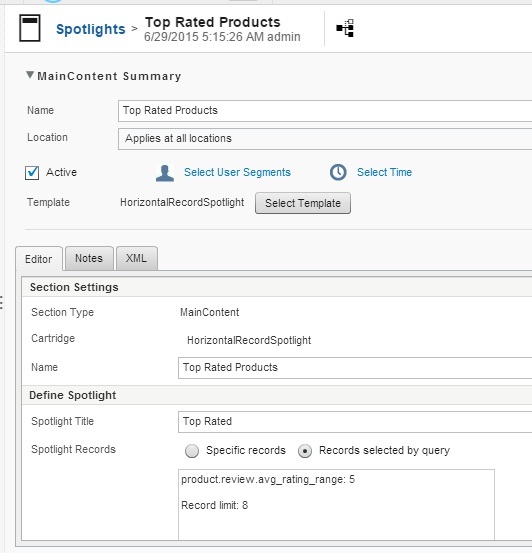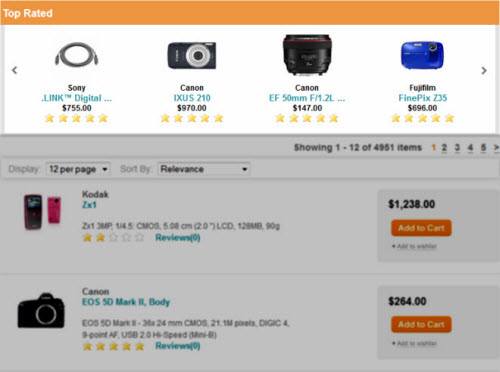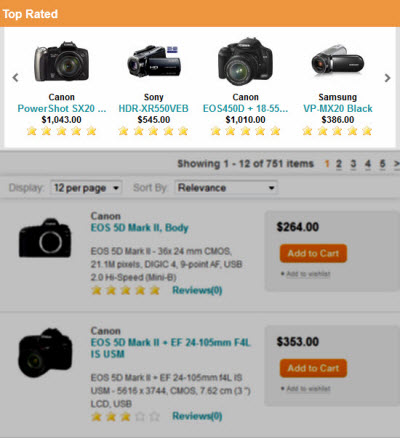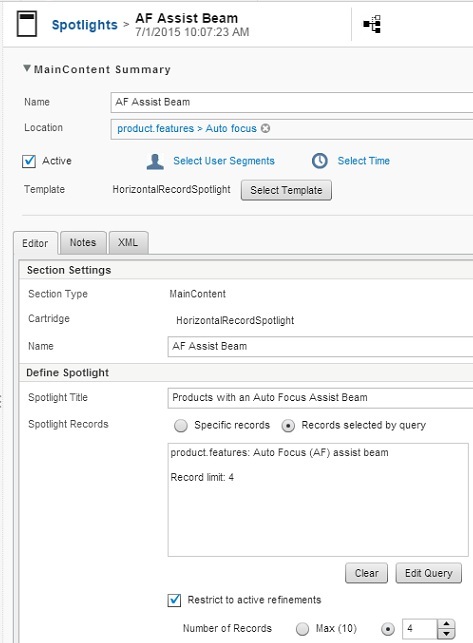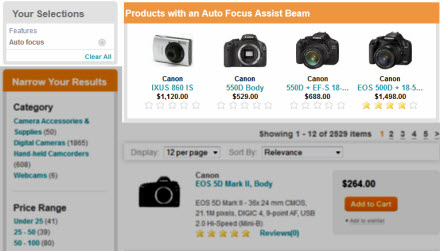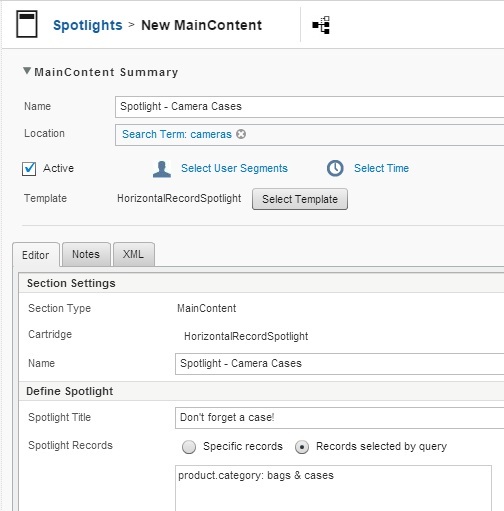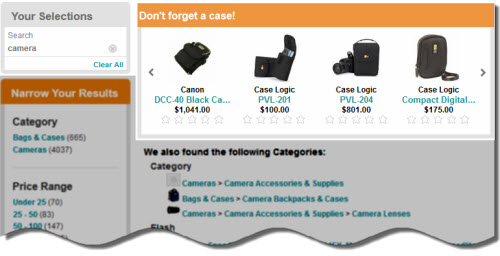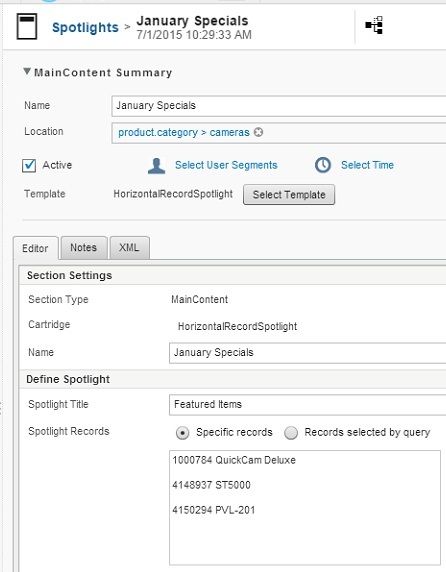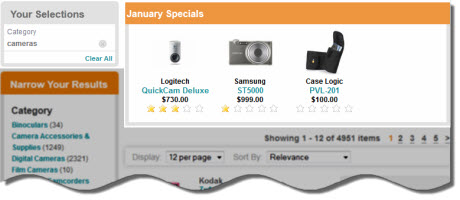A rule consists of two parts: information (such as records in a data set), and the associated triggers that determine when that information is displayed in your application.
Rules are the heart of the Content Spotlighting feature in an Assembler application. Content Spotlighting is the process of identifying and promoting contextually relevant data to users as they navigate or search within a data set.
The MDEX Engine compares each end user query to the rules in an application to determine if the query matches any existing triggers. If an end user's search query, navigation state, user segment, or environment (such as the date) matches a rule trigger, the MDEX Engine returns the corresponding records. These can include the following:
Oracle Commerce applications are tailored to present contextually relevant content to the end user. You can use Workbench to trigger content based on an end user's individual characteristics, on their search queries and navigation selections within your application, or on external factors such as date and time.
Taken together, the combination of an end user's search and navigation state, the user segment they belong to, and any other external factors that trigger rules (such as the user's geographic position or the current date) can be considered the user's "location."
When planning your Content Spotlighting strategy, think of your application in terms of which location displays which content. For example:
The main navigation sidebar and results list in your application page should remain fairly consistent. These should be triggered by default.
You may wish to display a seasonal banner image. This should be configured as four separate banners, one for each season, each with a date-driven trigger.
You might display a "featured products" sidebar that displays the highest-rated results in an end user's currently selected category. You could configure this item to appear whenever a user has a non-zero navigation state (that is, whenever they have selected any category in the navigation sidebar), and to show records with a high "product rating" value within the user's current navigation state.
You might display a "selected specials" sidebar that only triggers for a certain search or navigation state, such as when the user enters "specials" as a search query.
This overview is meant as a high-level introduction to how triggers drive the behavior of your application. For more detailed information, see "About controlling the display of content" in this guide.
Thesaurus entries allow you to broaden application search results to account for alternate forms of an end user's search query.
Thesaurus entries provide concept-level mappings between words and phrases. For example, if users enter the search term "cab" to search for "Cabernet Sauvignon," you can create a thesaurus entry to equate "cab" with "Cabernet Sauvignon."
You can add two kinds of entries to the Thesaurus:
One-way thesaurus entries map a search term to an equivalent term, but not the reverse. For example, a one-way mapping of "silver" to "metal" returns results for "silver" any time an end user's search query includes the word "metal." It does not include results for "metal" when a user searches for "silver."
Multi-way thesaurus entries establish a mutual equivalence between words or phrases, so the two become interchangeable.
You might find it useful to examine reporting data for your application when creating thesaurus entries. If you find that users frequently search for a term you had not expected, you can create a form equivalence mapping in your thesaurus.
Keyword redirects are used to redirect a user's search to a URL. This URL can represent a static page in your application (such as an "About Us" page) or a specific search or navigation state.
A keyword redirect triggers on one or more specified search terms. If an end user enters the specified term or terms, the application redirects them to the specified location.
Your technical team must modify the application code to properly handle keyword redirects and display the specified Web page when a redirect triggers.
When a site visitor enters individual search terms in a query, the automatic phrasing feature groups specified individual terms into a single search phrase and returns search results for the phrase.
Automatic phrasing is similar to placing a single set of quotation marks around multiple search terms before submitting the query. For example, “my search terms” is the phrased version of the query my search terms. Automatic phrasing removes the need for application users to place quotation marks around search phrases to get phrased results.
Content Spotlighting in an Assembler application is based off the end user's state in the application, rather than on static content that does not respond to changes in context.
Content Spotlighting in Oracle Commerce applications works differently from traditional content management systems (CMS), where you select an individual record for promotion, place it on a template or page, and then publish it to a Web site. Oracle Commerce merchandising is dynamic. When a user's query triggers a rule, the rule specifies contextually relevant records to promote to a multichannel application. In some cases, triggers specify how to promote records, but do not necessarily determine what those specific records are. For example, a "Featured Products" rule may return the top-rated products in the user's current category.
This means that as users navigate or search, they continue to see relevant results because appropriate content triggers are in place. Even when the data set itself is updated and the records are altered, existing rules can continue to return relevant records. The trigger conditions remain the same, even though the promoted records may change.
Instead of manually configuring static promotions, you can use rules to dynamically generate relevant promotions from your source data.
In a traditional CMS scenario, if Wine A is “recommended,” it is identified as such and published onto a static page. If you need to update the list of recommended wines to remove Wine A and add Wine B to the static page, you must manually remove Wine A, add Wine B, and publish the changes. With Oracle Commerce Content Spotlighting, the effect is much broader and requires much less maintenance. You can create a rule that promotes wines with a “recommended" value, and design the search results page to include that rule when available.
In this scenario, the recommended Wine A is promoted any time the trigger conditions for the rule are met, and the rule is included in the user's current page. Additionally, updating the spotlight to remove Wine A and add Wine B requires updating the source data to reflect that Wine B is now tagged as “recommended.” In this way, the application remains accurately data-driven.
After making the change, Wine B is promoted on any number of pages that specify recommended wines in the result set, without adjusting or modifying the rule triggers or the page layout.
Content Spotlighting provides the ability to specify featured records. When a user's location triggers a rule that specifies a featured record, that record is returned in addition to the normal search query or Guided Navigation results.
In addition to using content triggers to implement dynamic spotlights, Oracle Commerce provides support for static spotlighting in the more traditional CMS sense.
You can configure a rule to return a combination of featured static records, featured dynamic records, and a record list of dynamically generated results.
This section contains some typical merchandising scenarios. These examples use the Discover Electronics reference application to demonstrate how various cartridge configurations can fulfill strategies for promoting featured records. The configuration described in each example is not included in the reference application by default, though you may choose to reproduce it.
In this up-sell scenario, the strategy is to promote results that have been highly rated, and return a dynamically generated set of records that also take into account the user's location in the data set.
The rule for accomplishing this has the following configuration:
It is configured as a Horizontal Record Spotlight cartridge that fills a corresponding slot in the "Default Guided Navigation Page" rule.
It has a Location trigger that allows it to display at any location in the data set where there isn't a higher priority rule in the same slot; in other words, it always triggers, regardless of the user's location.
It spotlights records based on a
product.review.avg_rating_rangevalue of 5 in the data set, indicating a high review score. Whenever the data is updated, the rule automatically returns the new records, without requiring changes to its cartridge configuration.
As a user searches or browses, the rule returns results with a high review rating. Any navigation state triggers the spotlight, because it triggers at all locations.
If a user navigates to the "Cameras" category, the application displays the regular navigation results, as well as 10 spotlighted records in the horizontal spotlight:
Because the trigger is restricted to the active navigation state, the results vary depending on the user's navigation location. For example, instead of navigating to → , suppose a user navigates to products that are black and feature manual focus. The MDEX Engine returns a different set of dynamically generated results for the Top Rated Products spotlight:
In this cross-sell scenario, the strategy is to promote results in a category that is similar to the one a user is currently browsing. In this example, when a user selects the → dimension value, a spotlight displays results that also include the Auto Focus (AF) Assist Beam feature.
The rule for accomplishing this has the following configuration:
It is configured as a Horizontal Record Spotlight cartridge that fills a corresponding slot in the "Default Guided Navigation Page" rule.
It has the display title “Products with an Auto Focus Assist Beam”
It has a Location trigger that activates the rule when a user navigates to → .
It spotlights records within the
product.features>Auto Focus (AF) assist beamdimension value.It restricts spotlighted records to the current navigation state, so that they match any additional refinements the user has selected.
If a user navigates to → , the application displays the regular navigation results, as well as the spotlight for records for products with an Auto Focus Assist Beam:
In this cross-sell scenario, the strategy is to promote results in a category that is linked to a user's search query. In this example, a spotlight displays camera cases when a user searches for "camera."
The rule for accomplishing this has the following configuration:
It is configured as a Horizontal Record Spotlight cartridge that fills a corresponding slot in the "Default Guided Navigation Page" rule.
It has a Location trigger of "Search Term: cameras" with a "Match Exact" match mode. This activates the rule when a user searches for "camera," with no additional search terms.
It spotlights records within the
product.category>bags & casesdimension value.
If a user searches for "camera," the application displays the regular navigation results and displays records for camera cases in the "Don't Forget a Case!" spotlight.
In this featured results scenario, the strategy is to promote three specific cameras as featured results when a user navigates to the "cameras" category in the month of January.
The rule for accomplishing this has the following configuration:
It is configured as a Horizontal Record Spotlight cartridge that fills a corresponding slot in the "Default Guided Navigation Page" rule.
It has a Location trigger that activates the rule when a user navigates to → .
It has a Time trigger spanning from midnight January 1, 2013 to midnight on January 31, 2013. This activates the rule when a user browses the site during the month of January.
It spotlights three specific records. The order in which these results are added dictates the order in which they appear in the rule.
If a user navigates to → during January, the application displays the regular navigation results, as well as the spotlight for records:
